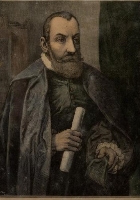Jan Kochanowski
Jan Kochanowski Poems
My good and noble health,
Thou matter'st more then wealth.
None know'th thy worth until
...
Come, Heraclitus and Simonides,
Come with your weeping and sad elegies:
Ye griefs and sorrows, come from all the lands
...
If I had ever thought to write in praise
Of little children and their simple ways,
Far rather had I fashioned cradle verse
...
So, thou hast scorned me, my delight and heir;
Thy father's halls, then, were not broad and fair
Enough for thee to dwell here longer, sweet.
...
Thou hast constrained mine eyes, unholy Death,
To watch my dear child breathe her dying breath:
To watch thee shake the fruit unripe and clinging
...
Thou shouldst be purchased, Wisdom, for much gold
If all they say of thee is truly told:
That thou canst root out from the mind the host
...
Just as a little olive offshoot grows
Beneath its orchard elders' shady rows,
No budding leaf as yet, no branching limb,
...
Dear little Slavic Sappho, we had thought,
Hearing thy songs so sweetly, deftly wrought,
That thou shouldst have an heritage one day
...
Sad trinkets of my little daughter, dresses
That touched her like caresses,
Why do you draw my mournful eyes? To borrow
...
Thou hast made all the house an empty thing,
Dear Ursula, by this thy vanishing.
Though we are here, 'tis yet a vacant place,
One little soul had filled so great a space.
...
My dear delight, my Ursula, and where
Art thou departed, to what land, what sphere?
High o'er the heavens wert thou borne, to stand
...
'Virtue is but a trifle!' Brutus said
In his defeat; nor was he cozened.
What man did his own goodness e'er advance
...
I think no father under any sky
More fondly loved a daughter than did I,
And scarcely ever has a child been born
...
Ursula, winsome child, I would that I
Had never had thee if thou wert to die
So early. For with lasting grief I pay,
...
Where are those gates through which so long ago
Orpheus descended to the realms below
To seek his lost one? Little daughter, I
...
Long through the night hours sorrow was my guest
And would not let my fainting body rest,
Till just ere dawn from out its slow dominions
...
Golden-locked Erato, and thou, sweet lute,
The comfort of the sad and destitute,
Calm thou my sorrow, lest I too become
...
Misfortune hath constrained me
To leave the lute and poetry,
Nor can I from their easing borrow
...
God hath laid his hand on me:
He hath taken all my glee,
And my spirit's emptied cup
...
We are thy thankless children, gracious Lord.
The good thou dost afford
Lightly do we employ,
...
Jan Kochanowski Biography
Jan Kochanowski (Polish: [ˈjan kɔxaˈnɔfskʲi]; 1530 – 22 August 1584) was a Polish Renaissance poet who established poetic patterns that would become integral to the Polish literary language. He is commonly regarded as the greatest Polish poet before Adam Mickiewicz, and the greatest Slavic poet prior to the 19th century. Kochanowski was born at Sycyna, near Radom, Poland. Little is known of his early education. At fourteen, fluent in Latin, he was sent to the Kraków Academy. After graduating in 1547 at age seventeen, he attended the University of Königsberg (Królewiec), in Ducal Prussia, and Padua University in Italy. At Padua, Kochanowski came in contact with the great humanist scholar Francesco Robortello. Kochanowski closed his fifteen-year period of studies and travels with a final visit to France, where he met the poet Pierre Ronsard. In 1559 Kochanowski returned to Poland for good, where he remained active as a humanist and Renaissance poet. He spent the next fifteen years close to the court of King Sigismund II Augustus, serving for a time as royal secretary. In 1574, following the decampment of Poland's recently elected King Henry of Valois (whose candidacy to the Polish throne Kochanowski had supported), Kochanowski settled on a family estate at Czarnolas ("Blackwood") to lead the life of a country squire. In 1575 he married Dorota Podlodowska, with whom he had seven children. Kochanowski is sometimes referred to in Polish as "Jan z Czarnolasu" ("John of Blackwood"). It was there that he wrote his most memorable works, including The Dismissal of the Greek Envoys and the Laments. Kochanowski died, probably of a heart attack, in Lublin on 22 August 1584.)
The Best Poem Of Jan Kochanowski
On Health
My good and noble health,
Thou matter'st more then wealth.
None know'th thy worth until
Thou fad'st, and we fall ill.
And every man can see,
In stark reality,
And every man will say:
"'Tis health I need today".
No better thing we know,
No dearer gem we owe,
For all that we possess:
Pearls, stones of great finesse,
High offices and power
- One may enjoy this hour -
And so the gifts of youth,
And beauty are, in truth,
Good things, but only when
Our health is with us then.
For when the body's weak,
The world around is bleak.
O jewel dear, my home
Awaiteth thee to come;
With thee it shall not perish.
'Tis all for thee to cherish.
